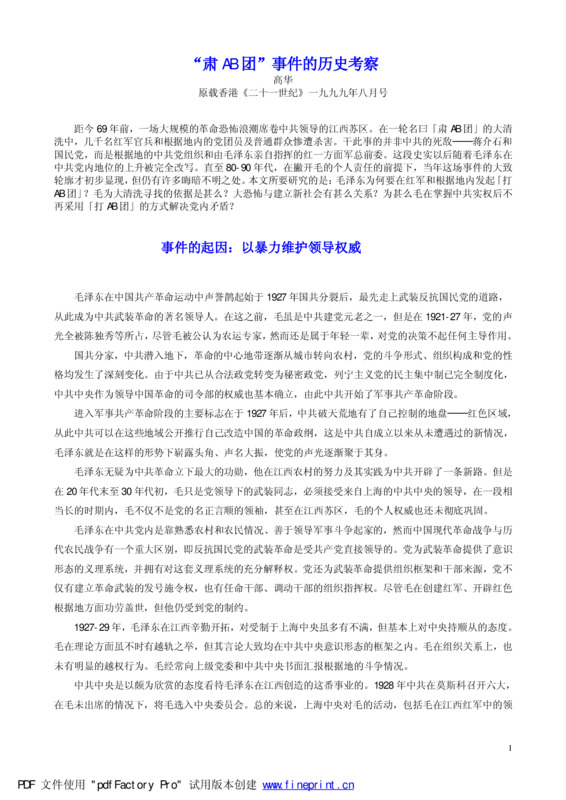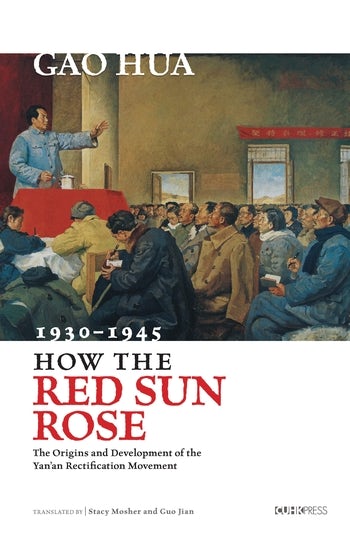Explore the collection
Showing 9 items in the collection
9 items
Book
Active Life
This is a collection of essays by Cui Weiping, a professor at the Beijing Film Academy. The title, inspired by Hannah Arendt, covers a wide range of fields from poetry and movies to politics and ethics, and tells the stories of fascinating people, the construction of their inner world and external lives. These people include Hai Zi, Wang Xiaobo, Arendt, Woolf, Beauvoir, Tarkovsky, Kremer, Herbert, Havel, and many others. Behind these seemingly unrelated names, there are hints of these two interdependent spiritual dimensions: on the one hand, the construction of the external world in which we live; on the other hand, the construction of our own inner world, which cannot be neglected. This book, published by Renmin University of China Press in 2003, has had a significant impact on the development of civil society in China.
Book
At the Crossroads of History
This book is Gao Hua's next masterpiece after *How the Red Sun Rose*. It entails a selection of papers published by the author between 1988 and 2004, covering the fields of Republican history, Communist Party history, and contemporary Chinese history. It captures the historical interaction between the present and the past. Gao reflects deeply on the far-reaching Chinese Communist Revolution. With a rigorous and empirical research methodology, he sketches a complex and colorful picture of history, presenting the multiple facets of twentieth-century China's history.
Article
Historical Examination of the Purge of the "AB" Regiment
More than 70 years ago, a massive wave of revolutionary terror swept through the CCP-led Jiangxi Soviet Union. Thousands of Red Army officers and soldiers, as well as members of the Party and the general public in the base area, were brutally murdered in a purge called the "Purging of the AB Troupe." Gao Hua's article examines why Mao Zedong initiated the "purge of the AB Group" in the Red Army and the base areas. What was Mao's rationale for the Great Purge? What is the relationship between the Great Terror and the establishment of a new society? Why did Mao stop using the "Fighting the AB Groups" as a means of resolving internal conflicts in the Party after he assumed real power in the CCP?
Book
How the Red Sun Rose
Originally published in Hong Kong in Chinese in 2000, Gao Hua’s epic description of an early Communist Party campaign against dissent describes a pattern of thought reform and control that would hold true for decades to come. Written despite official harassment and Gao’s failing health, How the Red Sun Rose is a touchstone for China’s unofficial history movement. It was translated into English in 2019 and published by Columbia University Press. Purchase here: https://cup.columbia.edu/book/how-the-red-sun-rose/9789629968229.
Book
The Realm of Historiography
This book is a compilation of some of Gao Hua's speeches, book reviews, commentaries on current affairs, reviews of student papers, and lecture transcripts. It includes his studies and reflections on themes around revolution, civil war, and nationalism, his comments on the works of Long Yingtai, Wang Dingjun, and Mao Zedong, and his observations on Taiwan's social and political realities during his visits to Taiwan. In addition, the book contains a selection of Gao Hua's lecture notes on the theory and methodology of historiographical research, as well as on the production of official historical narratives and the development of folk history, enabling readers to gain further understanding of the philosophy and methodology behind Gao Hua’s research.
The book was published by Guangxi Normal University Press in November 2015 before the fourth anniversary of Gao Hua's death, for which the publisher was disciplined by the Central Propaganda Department and the State Administration of Press, Publication, Radio, Film and Television.
Film and Video
Working toward a Civil Society (Episode 5): Cui Weiping
The Xi’an-based videographer Zhang Shihe, or Tiger Temple, has been a fixture on the independent Chinese history scene for more than twenty years. In 2010, he began a thirty-part series of short interviews with leading Chinese thinkers called “Working Toward Civil Society,” in which he explores how China can build a true civil society. Some of those interviewed have now been silenced, passed away, or moved abroad, making the series itself a work of history.
In this episode, Zhang interviews one of China’s most thoughtful public thinkers, Cui Weiping. Cui is a professor at the Beijing Film Academy, and translator of Havel into Chinese. She was a signer of Charter 08, and friend of the late Nobel Peace Prize laureate Liu Xiaobo. Although the interview is only 8 minutes long, Cui touches on some of the key problems that continue to plague China: how to break free of overwhelming government control of civic life?
Note to English speakers: this interview only has Chinese subtitles. The CUA is working to add English subtitles to all of our video offerings so check back in a few months.
Article
China Labour Bulletin Report Series on Labor Rights Protection in China
On June 12, 2025, the Hong Kong–based NGO China Labour Bulletin (CLB) announced its dissolution. This marks yet another Chinese civil society organization that ceased operations following the implementation of the Hong Kong National Security Law. Founded in 1994, CLB was dedicated to promoting the Chinese labor movement and had long focused on labor rights in China. Headquartered in Hong Kong, its founder Han Dongfang was a workers’ leader during the 1989 Tiananmen Democracy Movement and one of the founders of the Beijing Workers’ Autonomous Federation.
Over the years, China Labour Bulletin published dozens of reports in Chinese and English on China’s labor movement, addressing issues related to migrant workers, food delivery couriers, women workers, child labor, coal mining, and pneumoconiosis, among others. Following the organization’s dissolution, the China Labour Bulletin website was also taken offline.
In response, the China Unofficial Archives website immediately downloaded and preserved 80 Chinese- and English-language reports from the site. The following 26 reports are studies on the labor rights protection in China published between 2004 and 2024, including titles such as “Research Report on China’s Food Delivery Industry,” “Labor Rights in the Construction Industry,” “Healthcare Workers’ Rights Report,” and “Workers’ Rights in the Manufacturing Sector,” among others.
Article
China Labour Bulletin Report Series on Workers' Movement
On June 12, 2025, the Hong Kong–based NGO China Labour Bulletin (CLB) announced its dissolution. This marks yet another Chinese civil society organization that ceased operations following the implementation of the Hong Kong National Security Law. Founded in 1994, CLB was dedicated to promoting the Chinese labor movement and had long focused on labor rights in China. Headquartered in Hong Kong, its founder Han Dongfang was a workers’ leader during the 1989 Tiananmen Democracy Movement and one of the founders of the Beijing Workers’ Autonomous Federation.
Over the years, China Labour Bulletin published dozens of reports in Chinese and English on China’s labor movement, addressing issues related to migrant workers, food delivery couriers, women workers, child labor, coal mining, and pneumoconiosis, among others. Following the organization’s dissolution, the China Labour Bulletin website was also taken offline.
In response, the China Unofficial Archives website immediately downloaded and preserved 80 Chinese- and English-language reports from the site. The following 15 reports are observation reports on China's workers' movement.
文章
China Labour Bulletin Report Series on Trade Union Reform
On June 12, 2025, the Hong Kong–based NGO China Labour Bulletin (CLB) announced its dissolution. This marks yet another Chinese civil society organization that ceased operations following the implementation of the Hong Kong National Security Law. Founded in 1994, CLB was dedicated to promoting the Chinese labor movement and had long focused on labor rights in China. Headquartered in Hong Kong, its founder Han Dongfang was a workers’ leader during the 1989 Tiananmen Democracy Movement and one of the founders of the Beijing Workers’ Autonomous Federation.
Over the years, China Labour Bulletin published dozens of reports in Chinese and English on China’s labor movement, addressing issues related to migrant workers, food delivery couriers, women workers, child labor, coal mining, and pneumoconiosis, among others. Following the organization’s dissolution, the China Labour Bulletin website was also taken offline.
In response, the China Unofficial Archives website immediately downloaded and preserved 80 Chinese- and English-language reports from the site. The following 18 reports are studies concerning trade union reform in China.






